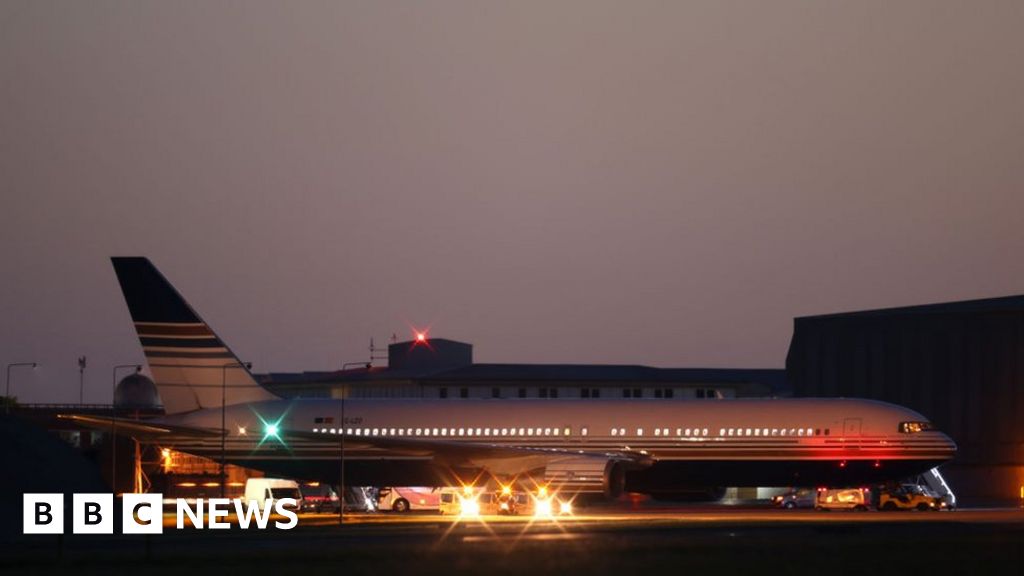- Composer: Harry Farley & Paul Seddon & Dominic Casciani
- bbc news
image source, Getty Images
The Home Office has admitted that most asylum seekers originally scheduled for deportation to Rwanda will not be immediately found.
Of the 5,700 asylum seekers initially identified, the government is unable to contact 3,557, according to a Home Office document.
“2,143 people continue to report to the Home Office and can be located for detention,” the document said.
Government officials denied the group was missing.
The official said reporting restrictions had been relaxed and they were not being held in government facilities, insisting that the Ministry of Interior could contact all those eligible for transfer to Rwanda if necessary.
Many asylum seekers are not staying in Home Office accommodation and must report to the Home Office in various ways.
Some people must report in person, while others report digitally and face less stringent requirements.
Government officials acknowledged that some people may flee before being taken into custody.
A former Border Force chief said he had committed an “act of disappearance” at a time when asylum seekers were facing deportation.
Kevin Saunders, former chief immigration officer at the Border Force from 2001 to 2016, said he was not “in the slightest” surprised that the Home Office had lost contact with asylum seekers.
Mr Saunders told BBC Radio 4's Today program that asylum seekers had previously been “ignored” of the Rwanda plan because they were told it would never materialize.
He insisted that no asylum seekers were missing and accused the Home Office of “teaching to pigs”.
But he added that the fact that asylum seekers “are already disappearing” shows that the Rwanda program is acting as a deterrent.
Under the law, migrants without permission to remain in the UK should only be detained if their departure is reasonably imminent.
This means that almost everyone who crosses the English Channel is staying in accommodation provided by the Home Office.
They are given phones to maintain contact with authorities and instructed to report to one of 13 immigration offices or the nearest police station, but the rules are flexible.
The Home Office's immigration reporting rulebook states that asylum seekers who have “no realistic timescale” for a final decision only need to report in person every three months. Groups of people who may be sent to Rwanda are “generally” required to report every two weeks, but that rule does not appear to be fixed.
In December last year, the Home Office separately canceled a pilot scheme to track 600 asylum seekers with ankle tags using GPS.
Britain's data protection watchdog said the 18-month trial plan was illegal.
Health Secretary Victoria Atkins said the Home Office was “used to” not being able to contact some asylum seekers.
She told Sky News: “Law enforcement agencies are using a variety of methods to find these people and I am sure they will be found and removed.
“We want to send the message loud and clear that if someone doesn’t report what they should, you shouldn’t think you can get away with it.”
Stephen Kinnock, Labour's shadow immigration minister, said: “This farce exposes the Tories' complete lack of control over the refugee system and the chaos at the heart of Rwanda policy.”
“The Prime Minister promised to arrest and remove everyone who crossed the Channel, but now we can't even find the people we were supposed to remove.
“How can the Conservative Home Office continue to lose so many people?”
The policy document details 5,700 people who Rwanda has already agreed to take in “in principle”. All those identified in the first cohort entered the UK illegally between January 2022 and June 2023.
They received a “notice of intent” that their asylum claims would not be accepted and that deportation to Rwanda was being considered before the Court of Appeal ruled on June 29, 2023, that the policy was illegal. I had already received it.
This means people who have arrived by small boat since last summer will not be disembarked on the first flight to Rwanda.
The latest information, included in the Equality Impact Assessment, also raised the possibility that lobbying by MPs could delay the deportation of asylum seekers.
“It is long-standing Congressional practice for Congressional representatives to withhold removals until the case has been considered and the Congressman has received a response,” the document said.
The report said that given the “novel nature” of the Rwanda plan, individual incidents “could attract significant attention from members of Congress, overwhelming response personnel and potentially delaying the response or canceling removals.” There is,” he added.
A Home Office spokesperson said a caseworker had been deployed to quickly respond to the MP.
Chancellor Rishi Sunak promised to start implementing these measures by July after legislation enabling the removals came into force last week.
The plan is a key part of his flagship pledge to stop small boats crossing the Channel.
A Home Office spokesperson added: “As we prepare for flights to take off, we are deploying hundreds of dedicated caseworkers to identify the first batch of people to be transferred to Rwanda and to handle any appeals.”
“It would be inappropriate to comment further on the operation.”
The government has never published the total number of asylum seekers it could send and insists there is no cap on the system.
Channel crossings continued on Monday after no migrants were confirmed arriving on Sunday. More than 7,000 migrants have arrived in the UK so far this year, according to Home Office figures.


